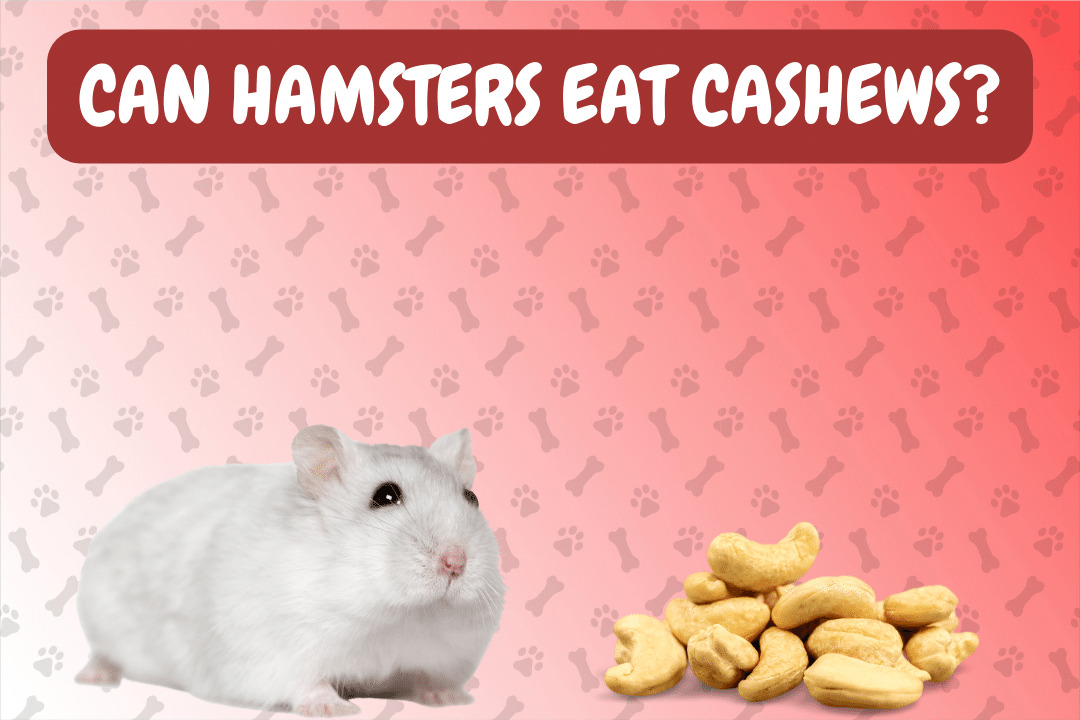No, hamsters can’t eat cashews, because they are high in fat and can lead to health problems in these small rodents.
Table of Contents
Introduction
Hamsters are delightful little pets known for their tiny size and adorable features. As responsible hamster owners, it’s essential to provide them with a safe and balanced diet. In this article, we’ll explore can hamsters eat cashews, delving into their nutritional value, potential risks, safe serving guidelines, and expert advice to help you make informed decisions about your furry friend’s diet.
Nutritional Value
Cashews are nuts known for their rich flavor and creamy texture. While they offer various nutrients for humans, such as protein, healthy fats, and vitamins, these nutritional benefits do not necessarily translate to hamsters. Hamsters have specific dietary requirements that are primarily met through commercial hamster pellets, which provide the necessary balance of nutrients.
Potential Risks
Feeding cashews to hamsters can pose several risks. Cashews are high in fat, which can lead to obesity in hamsters if consumed regularly. Additionally, hamsters have tiny cheek pouches where they store food, and large or hard items like cashews can become lodged in these pouches, leading to discomfort or injury.
How to Serve Safely
If you still wish to offer an occasional cashew to your hamster, it’s crucial to do so in moderation. Ensure the cashew is unsalted and unseasoned. Chop it into small, manageable pieces to reduce the risk of choking or issues with cheek pouches.
Serving Suggestions
While cashews may not be the best option for hamsters due to their high fat content, there are other safe treats available for these little pets. Hamster-safe fruits and vegetables like apples, carrots, and broccoli can be offered as occasional snacks.
Special Considerations
Consider any allergies or sensitivities your hamster may have. Some hamsters may have specific dietary preferences or intolerances, so it’s essential to monitor their reactions to new foods carefully.
Expert Opinion
Experts in hamster care generally recommend sticking to a balanced commercial hamster pellet diet. These pellets are specifically formulated to provide hamsters with the nutrients they need without the risk of overfeeding or offering foods that may be harmful.
Conclusion
In conclusion, cashews are not a recommended food for hamsters due to their high fat content and the potential risks they pose, including obesity and issues with cheek pouches. To ensure your hamster’s health and well-being, it’s best to prioritize their primary diet of commercial hamster pellets and offer safe treats like hamster-friendly fruits and vegetables in moderation.
FAQ
Q1: Can hamsters eat cashew, small piece as a rare treat?
A1: While it’s possible to offer a tiny piece of unsalted and unseasoned cashew as an occasional treat, it’s essential to do so sparingly and monitor your hamster for any adverse reactions.
Q2: Are there other nuts that hamsters can safely eat?
A2: Some nuts like plain, unsalted almonds and peanuts can be offered in very small quantities as occasional treats for hamsters. However, it’s essential to be cautious and avoid nuts high in salt or seasoning.
Q3: Can hamsters eat cashew shells?
A3: No, hamsters should not eat cashew shells. The shells can be challenging to digest and may cause digestive issues or obstructions.
Q4: Can hamsters eat cashew butter or cashew-based products?
A4: It’s best to avoid feeding hamsters cashew butter or any cashew-based products. These products can be high in fats and additives that may not be suitable for hamsters.
Q5: Can hamsters eat roasted cashews?
A5: Roasted cashews are typically high in salt and may contain seasonings or oils that are not suitable for hamsters. Stick to plain, unsalted cashews if you decide to offer them as an occasional treat.
Q6: Can baby hamsters eat cashews?
A6: Baby hamsters, or pups, have delicate digestive systems, and it’s best to avoid introducing any new foods until they are weaned and transitioned to a solid diet. Stick to their mother’s milk or specially formulated baby hamster food during this time.
Q7: Can hamsters develop allergies to cashews?
A7: While hamsters can develop sensitivities or allergies to certain foods, including nuts, it’s relatively rare. However, if you notice any unusual reactions or digestive problems after offering a new food like cashews, consult with a veterinarian.
Q8: Can hamsters eat cashew pieces or halves?
A8: Cashew pieces or halves can be a safer option than whole cashews, as they are smaller and may pose a lower risk of choking or pouch issues. However, it’s still essential to offer them in moderation.
Q9: Can hamsters eat cashews with no salt?
A9: Unsalted cashews are the safest option if you choose to offer them to your hamster. Remember to provide them in small, manageable pieces and limit the quantity to avoid potential health issues.
Q10: Are there specific hamster-safe nuts and seeds I can offer?
A10: Some hamster-safe nuts and seeds include plain, unsalted almonds, peanuts (in moderation), and sunflower seeds. However, these should also be given sparingly as occasional treats and not as a significant part of the hamster’s diet.
For other Hamsters food informations, read our blog.
Hello! I’m Max Walley, a pet enthusiast who knows a lot about what our animal buddies can munch on and what’s a no-no. With ‘canpeteat.it,’ I’m here to help pet owners make smart food choices. Come with me as we dive into the world of pet nutrition, discovering what keeps our furry pals joyful and in tip-top shape. Let’s explore this adventure together!


